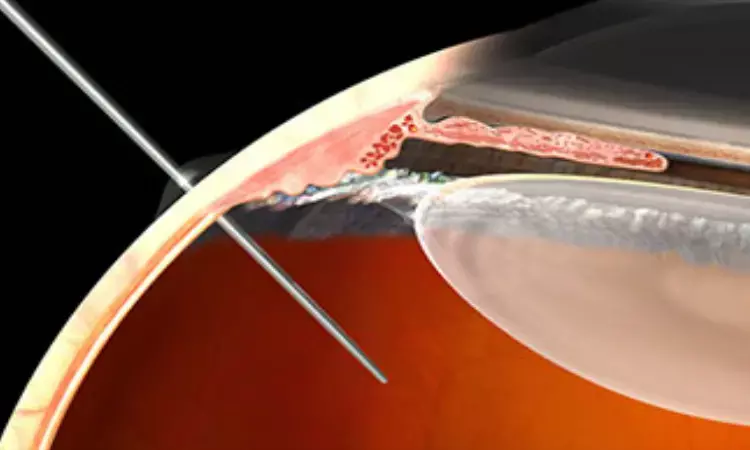- Home
- Medical news & Guidelines
- Anesthesiology
- Cardiology and CTVS
- Critical Care
- Dentistry
- Dermatology
- Diabetes and Endocrinology
- ENT
- Gastroenterology
- Medicine
- Nephrology
- Neurology
- Obstretics-Gynaecology
- Oncology
- Ophthalmology
- Orthopaedics
- Pediatrics-Neonatology
- Psychiatry
- Pulmonology
- Radiology
- Surgery
- Urology
- Laboratory Medicine
- Diet
- Nursing
- Paramedical
- Physiotherapy
- Health news
- Fact Check
- Bone Health Fact Check
- Brain Health Fact Check
- Cancer Related Fact Check
- Child Care Fact Check
- Dental and oral health fact check
- Diabetes and metabolic health fact check
- Diet and Nutrition Fact Check
- Eye and ENT Care Fact Check
- Fitness fact check
- Gut health fact check
- Heart health fact check
- Kidney health fact check
- Medical education fact check
- Men's health fact check
- Respiratory fact check
- Skin and hair care fact check
- Vaccine and Immunization fact check
- Women's health fact check
- AYUSH
- State News
- Andaman and Nicobar Islands
- Andhra Pradesh
- Arunachal Pradesh
- Assam
- Bihar
- Chandigarh
- Chattisgarh
- Dadra and Nagar Haveli
- Daman and Diu
- Delhi
- Goa
- Gujarat
- Haryana
- Himachal Pradesh
- Jammu & Kashmir
- Jharkhand
- Karnataka
- Kerala
- Ladakh
- Lakshadweep
- Madhya Pradesh
- Maharashtra
- Manipur
- Meghalaya
- Mizoram
- Nagaland
- Odisha
- Puducherry
- Punjab
- Rajasthan
- Sikkim
- Tamil Nadu
- Telangana
- Tripura
- Uttar Pradesh
- Uttrakhand
- West Bengal
- Medical Education
- Industry
Intravitreal injection of pegcetacoplan associated with presumed silicone oil droplets: JAMA

Recently, intravitreal pegcetacoplan became the first drug to gain US Food and Drug Administration approval for the treatment of geographic atrophy associated with nonexudative age-related macular degeneration, but the administration of this medication may be associated with unanticipated posttreatment complications. To assess the prevalence of presumed silicone oil droplets in the vitreous cavity after intravitreal injection of pegcetacoplan; Dessouki A et al carried a study. This case series study involved a retrospective record review of all 55 patients treated with intravitreal pegcetacoplan, 0.1 mL in 150-mg/mL solution, between March 24 and June 5, 2023, at a single specialty retina practice. All injections were done using needles from the kit supplied by Apellis Pharmaceuticals on a 1-mL McKesson Luer lock syringe.
Outcomes and Measures included the presence or absence of presumed silicone bubbles detected during dilated biomicroscopic fundus examination and/or on color fundus photographs, the presence or absence of symptoms, change in visual acuity, and/or increase in intraocular pressure.
A total of 62 intravitreal pegcetacoplan injections were given to 55 patients (mean [SD] age, 83.8 [7.8] years; 33 women [60%]) from March 24 to June 5, 2023. Of the 55 patients, 16 (29%; mean [SD] age, 83.8 [7.4] years; 9 women [56%]) had presumed intravitreal silicone droplets discovered 2 to 4 weeks after treatment, 3 of which were documented on color fundus photographs. Of the 16 patients, 14 (88%) were symptomatic for new floaters that they described as persistent, while 2 (13%) were asymptomatic. There were no signs of inflammation or infection, no increases in intraocular pressure, and no changes in visual acuity for all 16 patients.
A substantial percentage of patients had symptomatic floaters from presumed intravitreal silicone oil droplets after injections of pegcetacoplan using a McKesson 1-mL Luer lock syringe. These findings support consideration of informing patients of this potential adverse effect, avoiding use of the McKesson syringe, and considering use of silicone-free syringes for pegcetacoplan injections.
Source: Dessouki A, He L, Park K, Chen H, Chow CC. Presumed Silicone Oil Droplets After Intravitreal Pegcetacoplan Injections. JAMA Ophthalmol. Published online October 05, 2023. doi:10.1001/jamaophthalmol.2023.4326
Dr Ishan Kataria has done his MBBS from Medical College Bijapur and MS in Ophthalmology from Dr Vasant Rao Pawar Medical College, Nasik. Post completing MD, he pursuid Anterior Segment Fellowship from Sankara Eye Hospital and worked as a competent phaco and anterior segment consultant surgeon in a trust hospital in Bathinda for 2 years.He is currently pursuing Fellowship in Vitreo-Retina at Dr Sohan Singh Eye hospital Amritsar and is actively involved in various research activities under the guidance of the faculty.
Dr Kamal Kant Kohli-MBBS, DTCD- a chest specialist with more than 30 years of practice and a flair for writing clinical articles, Dr Kamal Kant Kohli joined Medical Dialogues as a Chief Editor of Medical News. Besides writing articles, as an editor, he proofreads and verifies all the medical content published on Medical Dialogues including those coming from journals, studies,medical conferences,guidelines etc. Email: drkohli@medicaldialogues.in. Contact no. 011-43720751


